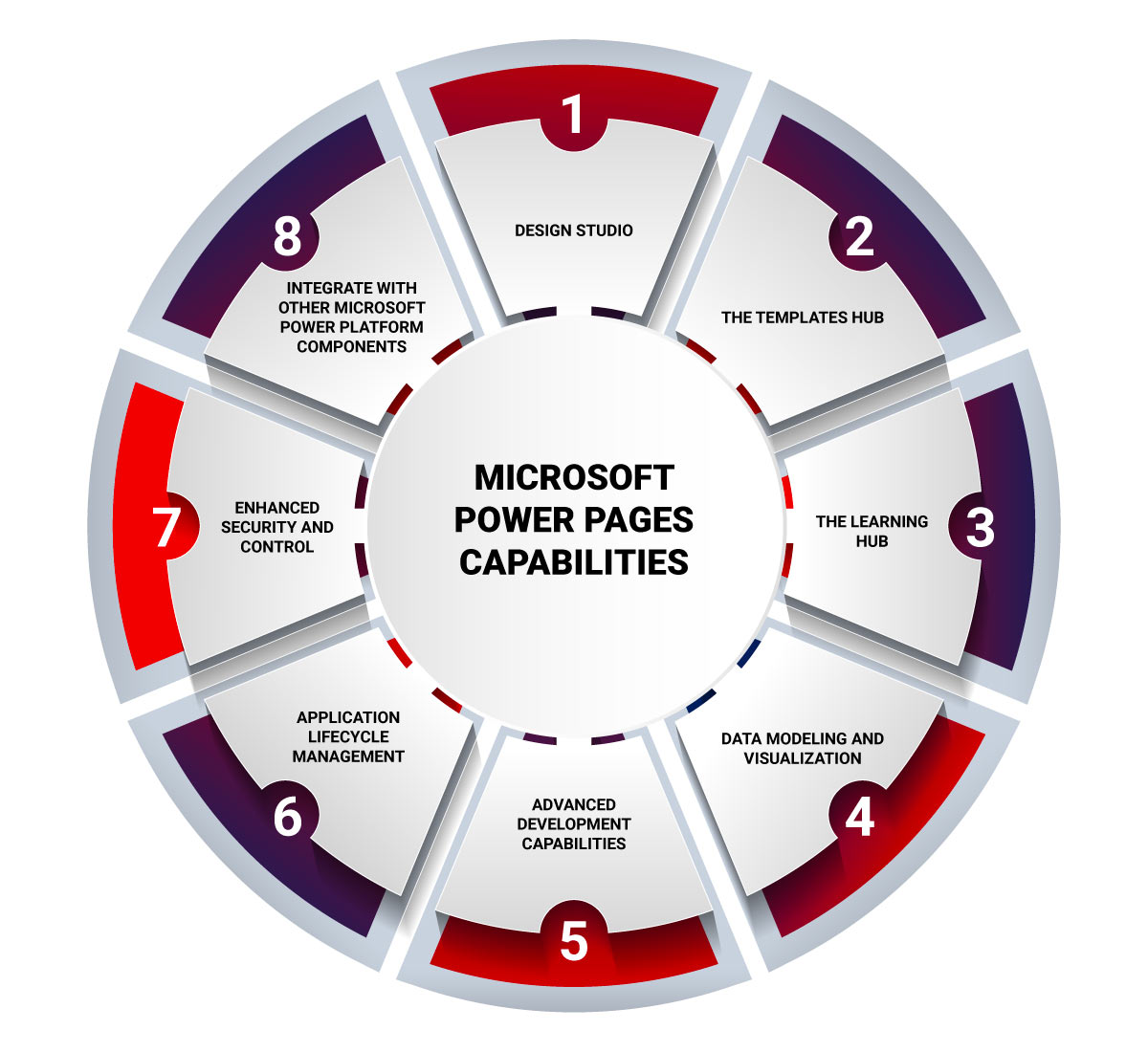In a digital landscape where first impressions are formed in a mere 0.05 seconds[1] and slow-loading websites cost retailers a staggering $2.6 billion U.S. dollars[2] in lost sales each year, the need for a game-changing solution becomes evident.
This is where Microsoft Power Pages takes the pain out of creating business websites. It is an effective platform for creating data-powered, modern, secure low-code websites for your business.
With its rich visual experience and advanced capabilities for customization with pro-dev extensibility, Power Pages allow you to build solutions that optimize business workflow with an external audience like customers, partners, and community members.
In addition to being low-code development, it can integrate with other Power Platform products, such as Power BI, to access components like analytics reports, dashboards, and visually immersive insights. This blog covers everything you need to unleash the full potential of MS Power Pages. So, let’s dive right in!
What is Microsoft Power Pages?
Microsoft Power Pages is a low code hosting SaaS platform, ideal for creating and launching external-facing business websites. Power Pages is a sub-category of Power Apps that provide a low-code way to create, host, and manage process-driven secure websites for external partners.
As a standalone SaaS platform built on Power Apps infrastructure, it offers scalability, enterprise-grade hosting, and pro-dev tooling to customize websites. Power Pages can be integrated with GitHub, Visual Studio Code Power Platform CLI, and Azure DevOps to let more advanced users automate development workflows and leverage CI/CD practices.
Microsoft recently introduced Power Pages Copilot – the next-generation AI in Power Pages. Thus, instead of the traditional click-based navigation, one can now use natural conversation to generate text, detailed forms, and chatbots to speed up a data-centric website-building process.
Key Capabilities and Components of Power Pages
With Power Pages, you can quickly create and design professional and secure websites using default templates, and it also allows you to choose from existing industry-based starter templates. Here’s an overview of the main Power Pages capabilities:

Design Studio
The Design Studio enables makers to easily create modern, responsive, data-centric business websites without writing a single line of code. With drag-and-drop functionality, you can effortlessly arrange page elements, choose from a range of rich, customizable components, and style them to match your brand guidelines. It eliminates the need for extensive coding knowledge and accelerates website development.
The Templates Hub
You can choose from a library of pre-designed templates, layouts, and styles to jumpstart your website development process. These templates are fully customizable so that you can tailor them to your business needs and brand guidelines.
The Learning Hub
This comprehensive resource includes tutorials, documentation, and step-by-step guides covering all the key website development aspects using Power Pages. Whether you are new to the platform or looking for advanced techniques, the Learning Hub equips you with the knowledge and skills you need to create a compelling business website.
Data Modeling and Visualization
Data workspace allows you to seamlessly integrate a website with databases and APIs to incorporate dynamic content into website pages. This capability lets you display real-time data modeling, create interactive visualizations, and deliver personalized user experiences.
Advanced Development Capabilities
Power Pages enable developers with best-in-class pro dev tooling to create powerful business websites. The in-line code editor allows experienced developers to add custom code snippets or tweak the underlying code for sophisticated customizations. The Visual Studio Code extension adds advanced capabilities so developers can leverage their existing skills and tools.
Application Lifecycle Management
Power Pages is compatible with pro code development platforms like GitHub and Azure DevOps, enabling seamless integration for application lifecycle management. It ensures seamless collaboration between makers and developers for efficient version control, quick bug tracking, and continuous integration and deployment.
Enhanced Security and Governance
Security is the first and foremost concern for CIOs when they think of launching an external website that exposes business data. Power Pages offer enhanced security features like,
- Turnkey integration with Azure Web Application Firewall.
- Empower makers and site admins with controls over who can see the site during development and who can take the site public.
- A Go-live checklist gives a site recommendation checklist before going live.
- Offers the ability to improve site responsiveness with support for Content Deliver Network (CDN) powered by Azure Front Door.
Integrate Power Pages with Other Microsoft Power Platform Components
Power Pages can be integrated with other Power Platform components to create end-to-end business solutions and drive innovation across the organization. So, you can leverage all other power platform products to build a holistic solution.
Dataverse
Makers and developers use Microsoft Dataverse to secure, store and manage data. The ability to extract from and find data in Dataverse is a key benefit of the Power Pages website.
Power Automate
Power Automate helps businesses by automating repetitive tasks. Makers, citizen developers, and pro developers use Power Automate cloud flows API to integrate with Power Pages. Integrating Power Automate with Power Pages allows for automating business workflow and data interaction.
Power BI
Power BI is an enterprise business intelligence tool to deliver insights with simple and interactive visualization. Integrating Power BI with Power Pages allows one to access components like reports and dashboards to gain enhanced insights into their data.
Power Apps
Power Apps is an enterprise SaaS platform to build custom mobile and web apps using low code development. Power Pages are built upon the Power Apps infrastructure, and integration allows a range of additional features that allows citizen developers and professional developers to build external-facing websites.
Power Virtual Agents
Power Virtual Agents enable you to create custom AI-powered chatbots. Integrating Power Virtual Agent allows you to add your bot to a website so visitors can interact with your bot directly for a range of requests on your portal’s page.
While its core capability lies in low-code website development, Microsoft has gone the extra mile with its Pro Developer tools. These tools enable seamless integrations with Microsoft Visual Studio, GitHub, or Azure DevOps, enabling programmers to leverage advanced functionalities and code extensions to infuse business websites with customized business logic.
Power Pages Benefits
Unlike conventional website development, which is complex, costly, and time-consuming, Power Pages allows for custom development without extensive coding. Apart from automatic updates and security support for building and launching business sites quickly, following are the distinct benefits of leveraging Power Pages over traditional website development:
- If you already use Microsoft products and services, developing your website within the Microsoft ecosystem enables seamless integration within the cloud-based Dataverse ecosystem. This eliminates the need to migrate from your existing data models while facilitating data sharing, collaboration, and consistent user experiences across various Microsoft tools and platforms.
- Since it is part of the Power Platform, it allows you to leverage all other products to build an end-to-end solution.
- You can leverage top-notch site security features from Microsoft Azure, including Front Door, Azure DDoS Protection, and web application firewalls supported by Power Pages, ensuring your website remains safeguarded in the ever-evolving digital landscape.
- Easy access to a wide range of professionally designed templates and layouts saves significant time and effort when creating visually appealing websites.
- Websites developed using Power Pages have the required scalability to handle increased traffic and integrate new functionality over time. You can customize the website to align with your business needs and brand guidelines.
- Power Pages provide regular updates that ensure the stability and reliability of your business website while eliminating the hassles of implementing updates manually.
- If you’re using Microsoft Azure, Office 365, or Dynamics 365, developing external-facing business websites within the Microsoft ecosystem will enable seamless integration with these services, resulting in better site functionality and performance.
- Microsoft Dataverse ensures secure integration of external enterprise data without inviting any replication issues. This lets developers seamlessly sync and share data from different sources and quickly create websites in desired formats.
- Developers can securely use Power Automate cloud flows from webpages using APIs and leverage powerful automation capabilities for business websites.
These benefits contribute to a swift, streamlined, efficient development process while improving website functionality and offering a more cohesive digital experience.
Examples of How to Use Power Pages
Power Pages extends the use of low-code web development from beyond basic projects to supporting enterprise-wide, professional solutions at scale. This includes:
Customer Self-service Helpdesk
The customer self-service site provides customers with 24/7 access to self-service knowledge and support resources. Customers can view the progress of warranty registration, returns, support inquiries, appointments, and bookings. It also enables internal employees to raise and monitor tickets with the internal IT support desk. Your employees can raise new ticket cases, view pending cases, and access the organization’s knowledge base.
FAQ Sites
Allows external stakeholders such as customers and partners answer to common queries about products, services, special events, policies, and procedures. Content administrators can organize the information around a topic, subtopic, and article framework so that users can easily find the answers they need.
Partner Support
The partner support site helps organizations streamline business workflows with their resellers, distributors, and partners for supplier onboarding, sustainability tracking, and vendor support. Since it offers real-time access to every stage of shared activities in one place, it allows companies to streamline business processes.
Community Portals
Allows system admins to set up community portals at scale for a particular group of stakeholders. It can be used to provide community services for use cases like self-service permitting, licensing, incident and outage reporting, and applying for grants.
Employee Self-Service Portal
It works much like a customer self-service portal, except it is more employee-centric to create an efficient and well-informed workforce. Employees can access the self-service site to get direct access to knowledgebase articles, post comments, and feedback on key topics.
Schedule and Manage Meetings
Allows your customers, partners, and internal staff to create a meeting scheduling website to book or reserve events, services, or resources from a secured platform.
Application Processing
It can be used to create an application submission portal, registration, or scheduling website. Existing examples include application websites for building permit applications, after-school program applications, and scheduling meetings with a financial institution; each uses components such as pages, basic forms, and customizable tables that can be modified to align with your specific project needs.
Order Returns
It allows for streamlining the order return business process. It allows customers to raise order return requests, view their return requests’ status, view their return history, and monitor the status of their refund.
Real-Life Power Pages Use Cases
Let’s look at how these renowned brands leveraged Microsoft Power Pages to create compelling digital experiences that helped them improve brand engagement, increase sales, and enhance customer experiences.
PWC
Big Four accounting firm PricewaterhouseCoopers (PwC) built a multitenant enterprise decision support site with Power Pages. Their existing full-stack application based on React, Node.js, and PostgreSQL was cumbersome and difficult to update.
In just six weeks, PWC created the Cyber Technology Rationalizer—the new PwC decision-making support solution using Microsoft Power Pages. It leveraged Power Pages to gain benefits of low-code development, including reducing costs and saving time. Since the Cyber Technology Rationalizer launch, PwC has achieved 85 percent cost and 30 percent time savings.
Suite Hub
A prominent travel and transportation company in the United Kingdom leveraged Power Pages and Dynamics 365 Sales to increase the overall efficiency of their booking process. They integrated Power Automate and Power Pages to build a seamless, user-friendly platform connecting accommodation providers and corporate bookers.
With the help of Power Automate flows, Suite Hub centralizes its business data, streamlines workflows, and automates bookings with the best prices in a transparent environment. This resulted in a 30 percent improvement in booking conversions.
Powering Businesses: How Rishabh Software Can Lend a Helping Hand
You need an experienced power platform consulting company to leverage the full benefits of Power Pages and maximize its functional capabilities. Being a Microsoft Solutions Partner, we can be your trusted Microsoft Power Platform consultant to empower your enterprise ecosystem and accelerate business process automation with low-code/no-code development.
Drawing on our extensive experience in UI/UX designing, application development, and implementation, we’ve successfully adopted and leveraged Power Platform from its early stage. Partner with us to accelerate your business growth, enhance efficiency and enable innovations leveraging Power Platform capabilities.
FAQs
Q. What is the difference between Power Pages and Power Apps Portals?
A. Power Pages and Power Apps Portals are two different offerings within the Microsoft Power Platform, each catering to different business needs.
- Power Pages is an enterprise-grade low-code SaaS platform for creating, publishing external business websites. It leverages low code and pro code development tools to rapidly design and publish data-driven business websites across web browsers and devices.
- Power Apps Portals enables businesses to build applications and websites to interact with customers, partners, or vendors. If you want to learn how to leverage Power Apps to automate processes and build business apps, head to our Microsoft Power Apps development services page.
Q. What is the pricing and licensing structure for Microsoft Power Pages?
A. Microsoft Power Pages come with two pricing options based on user access.
For authenticated users, the cost is $200 per month for 100 users per site. This plan includes:
- User access to low-code business websites
- Authenticated access
- Authentication providers
- Content delivery network support
- Dataverse storage
For anonymous users, the cost is $75 per month for 500 users per site. This plan includes:
- Anonymous access to low-code business websites
- Content delivery network support
- Dataverse storage
MS Power Pages licensing is classified into two categories based on user type:
- Authenticated Users can opt for a monthly subscription license or go with the pay-as-you-go meter based on the actual/expected number of unique authenticated users per website per month.
- Anonymous Users can purchase a monthly subscription license or use the monthly pay-as-you-go meter based on the expected or actual number of anonymous users per website.
Note: Microsoft frequently updates its licensing and pricing models, so it’s recommended to visit the official Microsoft Power Platform website for the most up-to-date and detailed information on licensing and pricing options for Microsoft Power Pages.
Q. What are the latest updates in Microsoft Power Pages?
A. Microsoft recently announced their 2023 release wave 1 plan for Power Pages, and it’s set for launch between April and September 2023. The core platform empowers makers to configure, modify, and use low-code or no-code methods to meet business requirements. Here’s a quick rundown of the latest Power Pages features:
- Power Pages seamlessly collaborate with other components within the Microsoft Power Platform. You can leverage the secure storage and efficient data management of Dataverse for business applications and Power Pages sites.
- Cloud flows can be used with Power Pages sites in a public preview.
- Anonymous access in Power Pages will be disabled.
- Bootstrap version 5 can now be used in Power Pages.
- The revolutionary Express Design feature enables seamless integration with a machine-learning system to create intelligent websites from various documents. With this capability, you can swiftly transform PDFs, PowerPoint presentations, and other documents into a dynamic website based on Power Pages.
Footnotes:
1. https://www.forbes.com/advisor/business/software/website-statistics/#sources_section
2. https://www.sweor.com/firstimpressions











 30 Min
30 Min


